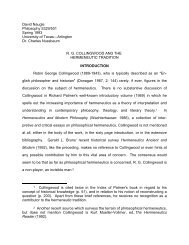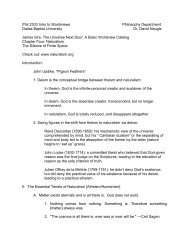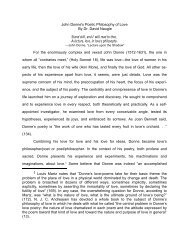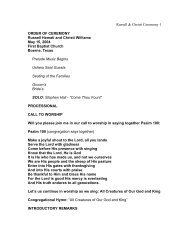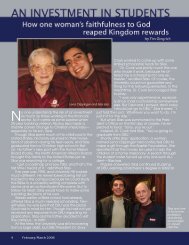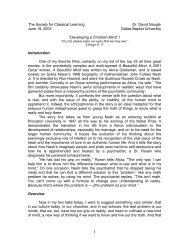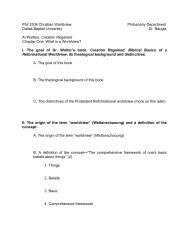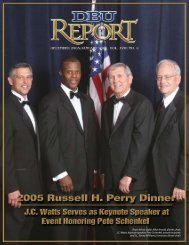A Bad Set of Fellows
A Bad Set of Fellows
A Bad Set of Fellows
You also want an ePaper? Increase the reach of your titles
YUMPU automatically turns print PDFs into web optimized ePapers that Google loves.
man to turn his face up to them as he froze to death and see no help or pity in all the<br />
glittering multitude” (45). Dickens suggests, if adults on earth abscond from their<br />
responsibility for the young, is there no hope from the heavens as well?<br />
The very hierarchy that keeps Pip under the absolute authority <strong>of</strong> his guardian,<br />
Mrs. Joe, who is twenty years older, fails to protect him because Mr. Joe does not assume<br />
the traditional role in that hierarchy. He is “a larger species <strong>of</strong> child, and . . . no more<br />
than my equal.” Moreover, Mrs. Joe uses Pip as a “connubial missile” (7). Thus Pip is<br />
beaten severely, and while still crying and rubbing himself, he is thrown at Joe. Joe<br />
worries if he thinks Pip eats too quickly, and spoons on extra gravy at Christmas, but he<br />
is incapable <strong>of</strong> saving Pip from unrelenting abuse.<br />
At the end <strong>of</strong> the novel there is, <strong>of</strong> course, hope for Pip to be a noble character<br />
despite his harsh treatment at the hands <strong>of</strong> Mrs. Joe. His moral downfall seems to have<br />
been more <strong>of</strong> his own making than <strong>of</strong> hers. Similarly, Biddy is very bright and good—in<br />
fact, a perfect woman—despite her “hopeless circumstances” (118) as an orphan also<br />
“brought up by hand” (40). She reflects the Wordsworthian, romantic view <strong>of</strong> children<br />
born wise beyond their years, with heavenly wisdom—what David Grylls calls the “cult<br />
<strong>of</strong> juvenile innocence” (133). Herbert, judging by Pip’s observations <strong>of</strong> the Pocket<br />
children’s “not growing up or being brought up, but . . . tumbling up” (172), is<br />
nevertheless a good person, even if he does seem to absorb some <strong>of</strong> the ineptitude <strong>of</strong> his<br />
parents.<br />
The doctrine <strong>of</strong> natural goodness in Victorian times held that it was wicked to rob<br />
children <strong>of</strong> their childhood, and that spoiling them was less harmful than making them<br />
assume adult hardship (Grylls 140). Miss Havisham, according to Herbert, was a “spoilt<br />
child,” a motherless girl whose father denied her nothing (166). She inherited his riches<br />
and pride, and now she is guardian <strong>of</strong> a “spoilt child” <strong>of</strong> her own, Estella.<br />
Far from being harmless, however, she is perhaps the most evil character in the<br />
novel in that she “is guilty <strong>of</strong> aggression against life in using the two children, Pip and<br />
Estella, as inanimate instruments <strong>of</strong> revenge for her broken heart—using them, that is, as<br />
if they were not human but things” (Van Ghent 131). Jaggers, who represents civil law,<br />
has placed Estella in harm’s way by placing her with Miss Havisham. Even play is a<br />
“sick fancy” <strong>of</strong> hers, by her own admission, and she spoils and manipulates Estella with<br />
jewels and with lessons on how to “break [Pip’s] heart” (54). Dorothy Van Ghent calls<br />
the scene where she orders the two children to play a “potent symbol <strong>of</strong> childish<br />
experience <strong>of</strong> adult obtuseness and sadism” (128).<br />
Estella is about Pip’s own age, but when he meets her she is “as scornful <strong>of</strong> me as<br />
if she had been one-and-twenty, and a queen.” She ruefully calls him “boy” (52). Miss<br />
Havisham has not only deployed a scheme to “wreak revenge on all the male sex” (164),<br />
but has abused Estella by robbing her <strong>of</strong> innocence and childhood. Miss Havisham’s<br />
“pride and hope” are in a girl whom she will fashion to have no mercy, like herself (88).<br />
John Kucich, in “Intellectual Debate in the Victorian Novel,” recalls that “Jaggers . . .<br />
presents Pip with a chilling vision <strong>of</strong> all the children in the world being ‘so much spawn,<br />
to develop into the fish that were to come to his net—to be prosecuted, defended,<br />
forsworn, made orphans, bedeviled somehow.” Yet Jaggers actually credits himself for<br />
sparing Estella—“one pretty little child out <strong>of</strong> the heap who could be saved” (229). The<br />
blind arrogance <strong>of</strong> one empowered to effect change may outrage readers.<br />
6



